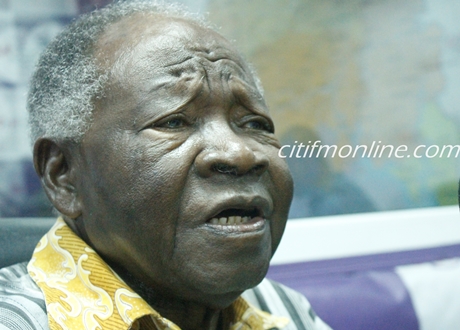If closely monitoring the major news bulletin for the day was such a herculean task to undertake at the expense of your lunch, then you may as well not have qualified to be a minister under Ghana’s first president, Dr. Kwame Nkrumah.
The reason was that these ministers were only ‘permitted’ to do so after the major news bulletin at 1PM.
[contextly_sidebar id=”5HfqL5EzVlWnlN0aWKZfsDTCE3Re6Gl7″]According to a former Diplomat who has worked with all successive governments since independence, Mr. K.B. Asante, some ministers were sacked from office during the news bulletin hence listening to the news was a matter of necessity rather than choice.
“It was believed that ministers did not take their lunch until after the 1 o’clock news because they were sacked very often at the 1 o’clock news without their knowledge, indeed some Ministers feared Nkrumah,” he said.
Mr. K.B. Asante who was speaking on leadership in Ghana on Time with Legends on the Citi Breakfast Show described the former President as a visionary person who worked to get results.
According to Mr. Asante, Kwame Nkrumah possessed great leadership qualities and skills that contributed to his success in reaching the level of economic development experienced during his nine years in office,
“If it means strength, character, he (Nkrumah) had it all, he also had a purpose and a vision. Kwame Nkrumah knew what he was doing, every morning when he came to the office, he had an idea and he will ask you to write a memo and within an hour he wants a draft to discuss,” Mr. Asante said.
Although Professor Kofi Abrefa Busia was an equally good leader and someone who was naturally interested in strengthening the local institutions, the former Diplomat believes Busia’s inclination to Western ideologies may have contributed to his overthrow.
“…perhaps that was why there was a coup, his ideas were not as centered on Ghana as Nkrumah, he (Busia) being a scholar and democrat went by the Western methods,” he said.
Kutu Acheampong in Mr. Asante’s view, was successful within the first three years of his governance as there were ‘rules and a purpose’ but declined moments after Ghana adopted models propounded by some international organizations like the IMF and subsequent lax in the economic policies.
Dr. Hilla Limann who in Mr. K.B. Asante’s estimation was a principled leader however had limited time to implement major economic reforms. This was also coupled with the economic instability he (Limann) succeeded.”
Fourth Republic
The leadership style of the first president under the fourth Republic, J.J. Rawlings the statesman described as one of an ‘impetuous’ leader who possessed some character traits of Kwame Nkrumah.
Rawlings’ success was however limited because according to Mr. Asante, he was ‘impatient’.
Meanwhile former President Kufuor was referred to as ‘normal’ leader who leaned more on the international community.
–
By: Pius Amihere Eduku/citifmonline.com/Ghana


